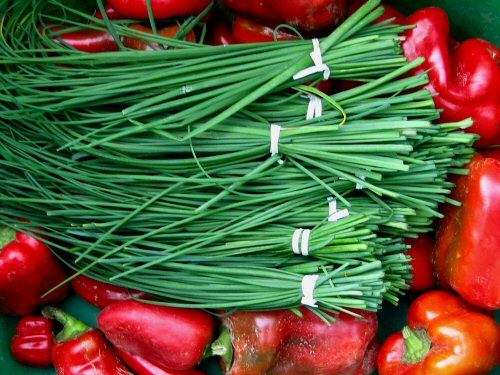Shallots have a distinctive tapered shape that sets them apart from other members of the onion family. Most often a copper brown color, they may also be reddish or gray. Their flavor, sometimes described as a blend of sweet onion and garlic, make them a favorite of gourmet chefs.
Garlic
Posted by
krizzyla
|
Garlic has the strongest flavor of all the alliums. A hardy perennial, garlic grows as bulbs, which are made up of cloves. One type of garlic that has become popular recently is Elephant garlic, which is a separate species (Allium scorodoprasum or Allium ampeloprasum). Elephant garlic has huge, very mild heads, and can either be sliced and eaten raw in salads or cooked and used as a substitute for onions.
Leek
Posted by
krizzyla
|
Leeks are the giants of the allium family. They can be up to nine inches long and two inches thick, and do not form a bulb. A national emblem of Wales, leeks were probably first brought to England by the Romans. France, Belgium, and the Netherlands are the world's leading producers of leeks, which feature prominently in the cooking of these countries. Also known as poor man's asparagus, leeks pair well with potatoes; their most familiar cooking use may be in leek and potato soup. Wild leeks, known as ramps, are native to eastern
Chives
Posted by
krizzyla
|
Chives look much like tall clumps of grass. (In fact, the alliums are closely related to grass.) Chives can be snipped and used from the garden as needed. Chives also add a mild onion flavour to soups, salads, and dips. Garlic chives (Allium tubersosum), also known as Chinese chives or Oriental chives, are a separate species. They can be used in much the same way for cooking, however, and are good as a mild garlic substitute.
Dealing With Onions
Posted by
krizzyla
|
To be able to buy and store considerable amounts of produce may be a great way of saving money and storing onions is just one example. Being efficient is practical and to maximize just about every dollar, reusing, recycling and even purchasing food like fruit and vegetables and also meat in big box stores allows a food budget to stretch farther and is particularly valuable when it comes to managing a household, successfully.
Onions could last for approximately 8 weeks when stored properly. Keeping onions is normally less costly and are meant to last. Storage onions typically have thicker, more dark skins and by keeping them in cool, dry areas in which there's good ventilation they could be stored for long periods of time. Storage onions have firm necks which also help to keep air outside as a result making them be preserved longer.
Onions storing is normally accomplished in a few different ways some of including suspending them upside down in any breathable mesh bag, keeping them separated on screens or shelves or inside paper bags. The use of paper bags is very affordable and by cutting the bags in half, straightforward removal and airflow can be achieved.Plastic packing containers aren't the right idea because these might promote the growth of mold and will result in the potatoes to sprout very quickly.
Benefits Of Onions
Posted by
krizzyla
|
The onion is a bulbous plant with hollow cylindrical leaves, long and thickened at the base that makes up the bulk of the bulb. The flowers of the onion, white or pink has six sepals, six petals, six stamens and one pistil. The fruits are small capsules containing their small seeds. Certain varieties of flowers are rather few bulbs that can be buried for new plants.
Onion is originally from Asia but has been cultivated widely in temperate and subtropical regions for thousands of years. It is indispensable in the kitchen because onion contains much water and you can cook it with little or no oil. This makes it useful to saute with other vegetables. It is very tasty either pickled, fried, boiled, baked or simply raw on enchiladas or salads. And don't forget good old fajitas.
In addition to its deliciousness, onion contains significant amounts of vitamins and minerals such as sulphur, phosphorus, iron, calcium, sodium and magnesium. The sulphur in onion is the volatile essences that gives it its characteristic pungency, which makes us cry when cutting onions because these essences come in through the nose and cause tearing. Always keep a fan blowing the air away from you while cutting onions.
Natural Medicine
Posted by
krizzyla
|
Ginger: Boundless Culinary and Medicinal Applications
Ginger is a root that is used in many culinary as well as medicinal applications. Versatile ginger has played a significant role in Chinese, Japanese and Indian medicine since the 1500s. It has been prescribed for a variety of ailments including stomach aches, colds, nausea, diarrhea, arthritis and respiratory disorders.
Ginger is especially well known for its effectiveness in alleviating gastrointestinal distress. Extracts of ginger are found in a multitude of commercial digestive, laxative and antacid remedies. Ginger relaxes the intestinal tract and promotes elimination of intestinal gas. It has also been shown to be effective in alleviating nausea and vomiting associated with pregnancy, chemotherapy, surgery, or motion sickness. Ginger may also be helpful in reducing symptoms associated with arthritis, joint and muscle pain because of its anti-inflammatory constituents called "gingerols." Nutritionally, ginger contains moderate amounts of potassium, magnesium, and vitamin B6.
Benefits of Ginger
Posted by
krizzyla
|
Did you know the benefits of ginger instead for using it in cooking? Yes, of course ginger is famous in making your food spices but there are many health benefits from it. Some of the benefits are it helps you in digestion and also curing the nausea.
Also, ginger helps you in easing dyspepsia or also known as an upset stomach. Ginger also assists you in colic treatment. By eating ginger, it can keep your gallbladder clean by removing the waste that prevents you from getting gallstones. Those who suffered from arthritis also can relieve their pain by eating the ginger.
Ginger root can reduce and sometimes can overcome your diarrhea disease, eliminate your nausea, and assist in improving your nose block. If you had an athlete’s foot fungus, ginger can help you in decreasing the burning feel. Ginger also acts as an anti-cholesterol agent and as blood thinner. A study made at Cancer Center University of Michigan shown that the powder of ginger persuades cell death on ovarian cancer to the applied cells. University of Minnesota also have made a study and found that the ginger slowing the cell growth of colorectal cancer.
Subscribe to:
Comments (Atom)


















